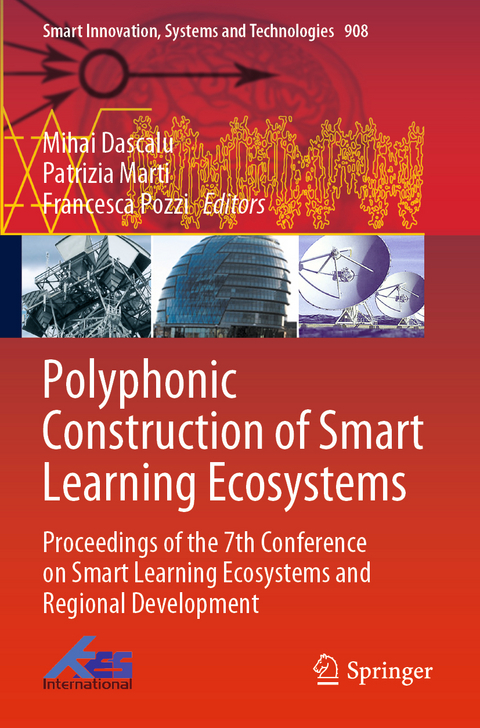
Polyphonic Construction of Smart Learning Ecosystems
Springer Verlag, Singapore
978-981-19-5242-5 (ISBN)
Mihai Dascalu is a professor at University Politehnica of Bucharest with a strong background in Computer Science applied in Education. He has extensive experience in national and international research projects with more than 200 published papers, including 30 articles at top-tier conferences, 80+ papers indexed ISI at renowned international conferences, and 10+ Q1 journal papers. Complementary to his competencies in NLP, technology-enhanced learning and discourse analysis, Mihai holds a multitude of professional certifications and extensive experience on strategic projects on non-refundable funds. Moreover, Mihai has obtained a Senior Fulbright scholarship in 2015, has become a fulbright ambassador since 2018, and holds the US patent. Mihai is also a corresponding member of the Academy of Romanian Scientists. Patrizia Marti is a professor of Experience Design at the University of Siena. She is the director and Rector’s delegate of Santa Chiara Fab Lab where she manages several participatory innovation projects with external partners. Patrizia has an interdisciplinary background in design, philosophy, and computing and a Ph.D. in Interaction Design. Her research activity concerns designing interactive systems in various fields of application including special education for people with disability also mediated by robots. He has been a principal investigator on many EU-funded projects. She has been an expert advisor to many EU and international bodies, including EU Commission, EU Future & Emerging Technologies Program, EU Intelligent Information Interfaces, Eurocontrol, EU Disappearing Computer, UX group at University of Warsaw (Poland), and Swedish Agency for Innovation Systems. She has been an invited keynote speaker at various international conferences. She has also been the editor for special issues of international journals. Francesca Pozzi is a lead researcher at the Istituto Tecnologie Didattiche (ITD) – CNR (Consiglio Nazionale delle Ricerche), where her main research area is the theory and practice of Technology Enhanced Learning (TEL). In particular, her main research interests include learning design; collaborative learning; computer supported collaborative learning (CSCL); teacher training and innovation in education; from formal to non-formal learning: ICT in cultural heritage education; technology enhanced learning for healthcare professionals’ training. She is the co-editor of the Italian Journal of Educational Technology (IJET) and is a member of various scientific boards and committees of international journals and conferences of the field. She has participated in and led several international research projects in TEL. She has published over 180 scientific papers, including +10 on Q1 journals, and several on books and conference proceedings (overall about 90 papers indexed in Scopus, 19 h-index).
Chapter 1. Context-Aware Classrooms as Places for an Automated Analysis of Instructional Events Philippe Dessus.- Chapter 2. Student smartphone experience narratives mediated by the phygital school library for learning ecosystems.- Chapter 3. Space and time in hybrid teaching and learning environments: two cases and design principles.- Chapter 4. The Italian School Ecosystems two years after the lockdown: an overview on the "digital shock" triggered by the pandemic in the perceptions of schools’ principals and teachers.- Chapter 5. Automated Paragraph Detection using Cohesion Network Analysis.- Chapter 6. Assessing Readability Formulas in the Wild.- Chapter 7. pROnounce: Automatic Pronunciation Assessment for Romanian.- Chapter 8. Community pacts and we4SLE as tools to support the implementation of Smart Learning Ecosystems.- Chapter 9. Digital Games as Tools of Innovative Pedagogy in Education.- Chapter 10. Environment Challenges of E-learning in Higher Education – the Teachers’ Perspective.- Chapter 11. Parents' voices: inclusion of students with Intellectual and Developmental Disabilities in higher education.- Chapter 12. Deidentification of Student Writing in Technologically Mediated Educational Settings.- Chapter 13. Conceptualising Micro-Credentials in the Higher Education Research Landscape. A Literature Review.- Chapter 14. Reaction of the university ecosystem to the pandemics in a mid-east country: the case of IRAQ - A compared analysis of students' and teachers' perceptions.
| Erscheinungsdatum | 03.10.2023 |
|---|---|
| Reihe/Serie | Smart Innovation, Systems and Technologies |
| Zusatzinfo | 38 Illustrations, color; 7 Illustrations, black and white; X, 228 p. 45 illus., 38 illus. in color. |
| Verlagsort | Singapore |
| Sprache | englisch |
| Maße | 155 x 235 mm |
| Themenwelt | Mathematik / Informatik ► Informatik ► Datenbanken |
| Informatik ► Theorie / Studium ► Künstliche Intelligenz / Robotik | |
| Sozialwissenschaften ► Soziologie | |
| Technik | |
| Schlagworte | Analytics • Big Data • Competence-based Learning • Ecosystem Benchmarking • Ecosystem Planning • Human-Centric Design • ICT Mediation • Info-Communication • Open Data • Regional Development • Smart City • Smart Learning Ecosystems |
| ISBN-10 | 981-19-5242-6 / 9811952426 |
| ISBN-13 | 978-981-19-5242-5 / 9789811952425 |
| Zustand | Neuware |
| Informationen gemäß Produktsicherheitsverordnung (GPSR) | |
| Haben Sie eine Frage zum Produkt? |
aus dem Bereich


